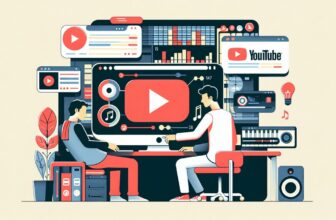Why is Music So Powerful?

The power of music is undeniable. From its ability to affect our emotions and memories to the way it unites people, music is one of the most powerful things in the world.
There has been a lot of research about music and its effects. However, there is no single explanation for why music has such a strong impact on people. There are several reasons why music might be termed powerful or moving.
People relate music to certain memories from their past. Music is often used as a way to communicate emotions and memories that words cannot properly express. Additionally, music can affect people physically. Another reason music is powerful is that music can help people to work together.
The bottom line is that music is powerful because it affects people in a variety of ways. It can communicate emotions and memories that words cannot, it can physically affect people, and it can bring people together. Music is truly the universal language.
Contents
Key Takeaways
- Music affects people’s emotions, boosting your current mood, happy or sad through heartfelt or upbeat music.
- Music’s effect promotes well-being, positively affecting mental health, and has been shown to greatly improve mental states and brain functions in Stroke, Alzheimer’s, Dementia, and Parkinson’s patients.
- Music helps release deep-rooted emotion and acts as a stress reliever, mood lifter, and anti-depressant (helps release Dopamine, Oxycontin, and Serotonin).
- Music improves the quality of life, in general, and is shown to be an excellent companion for workouts and creative expression.
Emotional Effects
Music has a way of affecting people’s emotions. It showcases the power it has on us by dictating our mood, as well as our movements.
Music affects our emotions and memories in a very powerful way. It can often be difficult to put into words the emotions that music evokes. For example, one might find themselves feeling nostalgic and happy when they hear a song from their childhood. Or, they may feel sad when listening to music that reminds them of a loved one who has sadly passed away.
The range of emotions a person can feel while listening to music is truly unmeasurable. It can change your mood in a matter of seconds. I feel that music at its best boosts your current emotions. When you feel happy and you also listen to a piece of music that makes you happy, it elevates your happiness, inspiring positive emotions. The same can be said when you’re feeling sad and you listen to sad music just to boost that emotion, to “get it out of you”.
Physical Effects
Music has the ability to physically affect people. Some music can make us want to dance, while other music can make us burst with energy and ready to run a marathon.
Another reason music has such a powerful impact on people is because it physically affects them. For example, music has been known to lower blood pressure and heart rate. It can also help people to feel more relaxed. Additionally, music is often used in therapeutic settings to help people deal with a variety of issues.
The physical effects of music are also very powerful. This is not to mean that music can literally move mountains, but rather it can inspire people to dance or sing along. Music has been scientifically proven as a great way to exercise muscles and improve coordination.
What Makes Music so Powerful?

Music helps you release dopamine which is a feel-good neurotransmitter. It also helps you release endorphins which makes music the best (and cheapest) anti-depressant, mood lifter, and stress reliever.
The release of dopamine in the brain is one way that music can affect people’s emotions and memories. Dopamine is a neurotransmitter that helps to tell the brain what we like or do not like. This means that dopamine helps the brain to figure out if we like music by releasing the chemical when we hear music that we enjoy.
The release of endorphins is also thought to be one of the reasons music is so emotionally powerful. Endorphins are hormones that are released by the brain in response to pain or stress. They are responsible for the “runner’s high” that people experience and they can also be released when listening to music. This explains why some people find themselves getting emotional when listening to music that they find particularly moving.
Music brings people together in a very powerful way. Music can be used to unite people in the same feeling or channel positive energy for an event. For example, music is often played at sporting events because it helps bring fans together and creates a sense of unity among them.
Depending on the music being listened to, music can have a profound effect on our physical state. Music can help people work out, music can calm people down, music can energize people, and even has been shown to impact personal and emotional health in general.
Music Therapy
Music can positively affect mental health, physical health, and social interactions.
Music therapy has been proven to be an effective treatment for conditions such as depression and anxiety. It can also be helpful for people who are recovering from surgery or who have a chronic illness. Additionally, music has been shown to improve physical health in several ways. It can help to lower blood pressure and heart rate, it can reduce stress levels and cortisol, and it can even boost the immune system.
Music therapy is a type of psychotherapy that allows patients to have creative moments as well as therapeutic ones. In terms of mental health, music can reduce stress and anxiety. It can also promote relaxation, peace, and tranquility.
Intonation therapy, a form of music therapy, can help stroke patients who have lost verbal function slowly regain their ability through stimulating verbal memory. Sound waves once again prove very useful for improving brain function.
Music therapy fundamentally helps people release their deep-rooted emotions (happiness/sadness) which are otherwise difficult to communicate. Additionally, music therapy has shown great promise in boosting brain activity in Alzheimer’s patients and people suffering from dementia.
Benefits of Music
Music stimulates your brain which leads to better learning. Music stimulates the left side of your brain which is associated with learning languages and mathematics. It helps you focus. Music stimulates your brain cells which makes students learn more quickly and people who listen to music more productive.
Music can also improve memory. When music is playing, the brain remembers what it saw better such as shapes or objects or even people. Countless studies were conducted on this subject, where people who listened to music showed better results in remembering stuff than people who didn’t.
It also improves mental health. Music helps to release several neurochemicals like:
- Dopamine – a hormone that makes us feel good;
- Oxytocin – a hormone associated with empathy, trust, etc;
- Serotonin – a chemical that works as a mood stabilizer.
Universal Language
Music is the universal language. It can unite people from all around the world who have different native languages, cultures, and religions. The music of their past connects them to a common aspect of humanity. In music, we find a type of emotional literacy that speaks to us in a way that transcends culture or language.
Music can communicate emotions and memories that words cannot express. It is a way for people to connect with each other on a deeper level.
Music While Working Out
Music has been found to improve people’s moods when they are working out. It can help people to push themselves harder and to stay motivated.
We’ve all had a tough time getting out of bed and going for a run or even working out at home. This is where music comes in. Music is the perfect motivation to do physical training. The right music can help you go that extra mile!
Music Helps You Enjoy Life

Music can make life better and help us live it fully and in the moment. It also has a therapeutic function. It can improve every aspect of life, as it can help you see the world through a different pair of eyes when you’re in a good mood. That’s where music shines, to help you feel happy and improve the quality of life.
Personally, happiness is the most important thing in anyone’s life. Music helps boost happiness on a day-to-day level, therefore, making it one of the most powerful things on this earth. When you’re happy, things tend to go a lot smoother.
Creative Expression
Creative expression through music is often a powerful experience. Music is endless because it is fueled by creativity. Every time you come up with something new, originality propels the music industry forward.
It helps with turning every emotion, whether it’s happy or sad, into something that can be interpreted in lots of different ways. It’s basically a way for musicians and artists to let go of emotions that are weighing them down, or happy emotions that can lead to more happiness for other people.
Music is Infinite
Music will never get old. It has the ability to discover and keep us interested in new things. There’s always something new to listen to, and there’s always a song that uniquely speaks to you and that’s the beauty of it. Music is infinite in its possibilities, from the smallest things to the most impactful aspects that change lives every day.
Summary
Music is one of the most powerful things on this earth. It can improve people’s moods, memories, mental health, and more. Music is also the universal language, which unites people from all around the world. Lastly, music is infinite in its possibilities and will never get old. Consequently, music is something that everyone should appreciate and enjoy. Thank you for reading!





